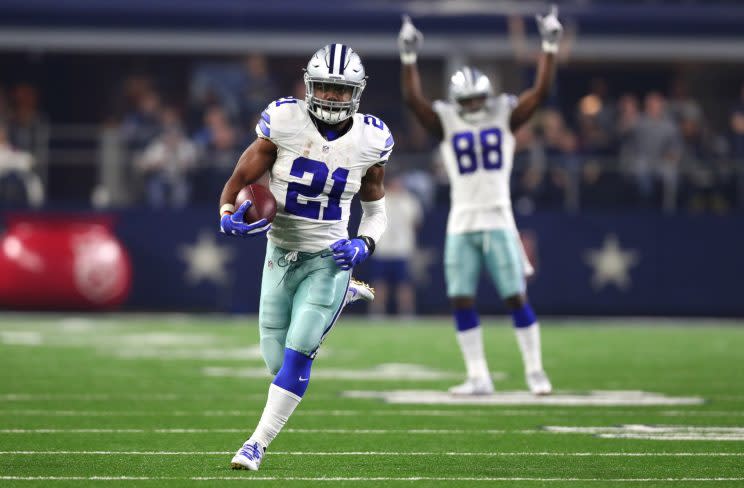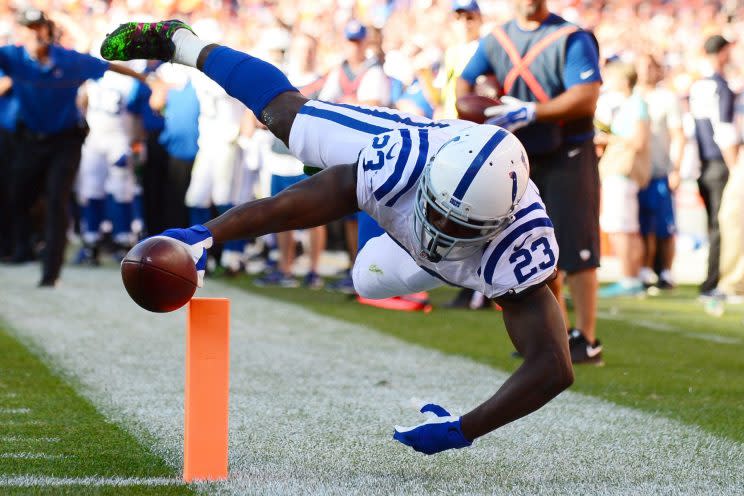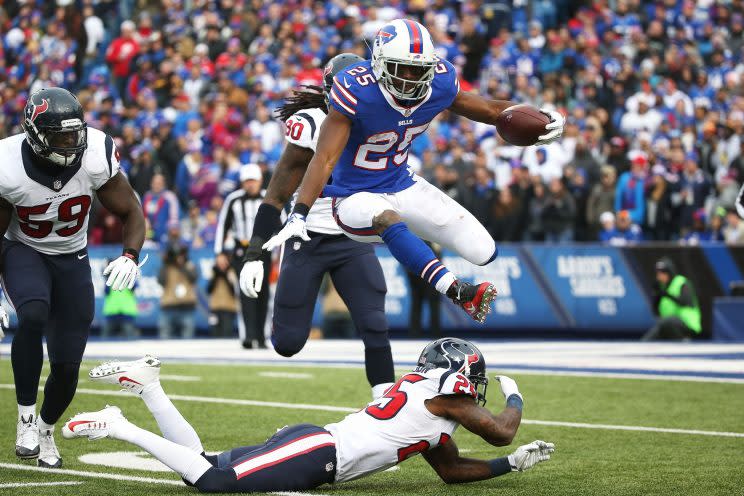Le'Veon Bell? David Johnson? Ezekiel Elliott? Ranking every team's RB situation
Running backs don’t hold the same value they once did. They have among the shortest average career length among skill-position players, and teams rarely use three-down backs any more. Instead, most teams employ a two-back system, with a pass-catching back on third downs. Yes, there are still some bell cows — and having a player that not only has the skills but also the durability to hold up like that is a major asset.
Ranking running back groups is a tough task. Depth is obviously important, but if a team has a proven workhorse back, is having extra backups all that important? For the vast majority of the league, several running backs will see significant action every Sunday. In that regard, grading running back situations via a points system is much more difficult than doing so for quarterbacks, as I did two weeks ago.
[Fantasy Football is open! Sign up now]
Overall, depth matters. But it matters more for some teams and less for others. So these rankings reflect that: based mainly on starters and third-down backs, but factoring in depth for teams without a true rep-dominant No. 1 back. Without further ado …

32. Detroit Lions
Starter: Ameer Abdullah
Third down: Theo Riddick
Backups: Zach Zenner, Matt Asiata, Dwayne Washington
The Lions find themselves at the bottom of this list after finishing 30th in the NFL last year in rushing yards per game. Four separate players started at least two games at running back in 2016, and neither Abdullah nor Riddick has been able to stay healthy for long enough to be considered reliable lead backs. While Zenner is a nice goal-line piece and Riddick catches the ball very well, not having a true lead back — much less a workhorse back — hurts Detroit in these rankings.
31. Washington Redskins

Starter: Robert Kelley/Samaje Perine
Third down: Chris Thompson
Backups: Matt Jones, Mack Brown
The Redskins had one of the most disappointing rushing attacks last season. Jones couldn’t shake his fumbling issues and lost the starting job to Kelley about halfway through the season. Now Jones wants out of town. The team drafted Perine in the fourth round after an ultra-productive career at Oklahoma, but how well he acclimates to the bigger, faster pro game is to be determined. Thompson, a skilled speedster who plays exclusively on third-down, is coming off a good season.
30. New York Giants
Starter: Paul Perkins
Third down: Shane Vereen
Backups: Shaun Draughn, Orleans Darkwa, Wayne Gallman
The Giants finished 26th in the league with just 26 percent of the team’s yards coming on the ground last year, and former starter Rashad Jennings is no longer dancing around defenders but on the dance floor. Perkins had some nice moments in his rookie season and should earn the starting role in his second season. Behind him, Vereen played just five games last season but is one of the league’s best passing-down backs.
29. New York Jets
Starter: Matt Forte
Third down: Bilal Powell
Backups: Brandon Wilds, Elijah McGuire
While essentially everything crumbled around them last year, Forte and Powell both managed solid years, especially considering the Jets presented almost no passing threat. Forte’s not his old self anymore, but he can still handle the first two downs and catch the ball well when needed. Powell, meanwhile, had his finest season as a pro by a wide margin, averaging 5.5 yards per rush and catching 58 passes. He’s a big reason the Jets come in one spot above their fellow Big Apple team.
28. Baltimore Ravens
Starter: Kenneth Dixon*/Terrance West/Lorenzo Taliaferro
Third down: Danny Woodhead
Backup: Javorius Allen
Who’s going to start for Baltimore? Well, it really depends on who you ask. The Ravens’ game sputtered last year, accounting for just 25.2 percent of the Ravens’ total yards. That mark was 29th in the league. West got the most work, but he didn’t do a ton with it. Dixon was the team’s most impressive back, but he’s suspended for four games, which impacts the team (and its place in these rankings) significantly. Woodhead is coming off a torn ACL and is 32, but if he can get back to near his best, he can be a useful and important part of this offense. Overall, having the depth the Ravens have helps, but unless someone really separates from the pack, it’s not a special backfield.
27. Denver Broncos
Starter: C.J. Anderson
Third down: Jamaal Charles/Devontae Booker
Backups: Juwan Thompson, De’Angelo Henderson
The Broncos are pretty similar to the Ravens, which is why the two find themselves next to one another in the rankings. There’s youth, experience and major health risks. Anderson has been effective when healthy, but he played just five games last year. Charles has played in just eight games in the past two years combined . Booker showed flashes as a rookie but has to take care of the ball. This group could disappoint again, as it did last year. Or Anderson could get back to a Pro Bowl level and Charles could show glimpses in spot duty of what he once was, proving this ranking too low.
26. San Francisco 49ers
Starter: Carlos Hyde
Third down: Tim Hightower
Backups: Kapri Bibbs, Joe Williams
Unlike most of the players on the San Francisco offense, Hyde is a really good player. He put up nearly 1,000 yards in just 13 games. He also caught more passes for more yards in his third year than in his first two seasons combined. San Francisco’s abysmal offense, though, limited him, and it will limit him again in 2017. Hightower brought his career back from the dead the last couple of seasons in New Orleans and was a valuable pickup as someone who can help on the field and in the locker room. Just like the 49er offense as a whole, there’s not a ton to be excited about from this group — at least not in its current state.
25. Indianapolis Colts

Starter: Frank Gore
Third-down: Robert Turbin/Christine Michael
Backups: Marlon Mack, Josh Ferguson
Say what will you will about Gore, but he’s absolutely one of the best running backs of his era. Look at his numbers. Nine seasons of at least 1,000 yards. Eight seasons with at least 250 yards receiving. No games missed over the last six years. There’s nothing even remotely pretty about his game. Rather, he is an unceasingly consistent force bowling toward you 260 times per year. Behind him, the Colts have several options to go with on third down.
24. Kansas City Chiefs
Starter: Spencer Ware
Third down: Charcandrick West
Backups: Kareem Hunt, C.J. Spiller
The Chiefs lost Jamaal Charles for the second straight year and still didn’t skip a beat, marching on to the playoffs thanks to Ware and West. Now the run-heavy Chiefs have added Spiller and Hunt, a rookie, to the backfield as well. The initial reports on Hunt are encouraging, and a healthy Spiller can be a weapon for any team.
23. Houston Texans
Starter: Lamar Miller
Third down: Miller
Backups: Alfred Blue, D’Onta Foreman
Miller received the biggest workload of his career in his first year in Houston, and it showed. In his first seven regular-season games, he surpassed 80 yards five times. Over the next seven, he only reached that mark three times. Miller missed the final two games of the season before averaging under three yards per carry in the playoffs. So the Texans drafted Foreman in the third round. How much and how well he can contribute will play a big part in keeping Miller fresh and boosting this attack.
22. Green Bay Packers
Starter: Ty Montgomery
Third down: Montgomery
Backups: Jamaal Williams, Aaron Jones, Devante Mays
After Eddie Lacy went down, Montgomery singlehandedly rescued Green Bay’s running game. The former wide receiver switched positions on the fly and averaged nearly six yards per carry. The performance was enough for the Packers to rid themselves of every other running back on the roster — Lacy, James Starks and Christine Michael — and start anew with Montgomery. When you have Aaron Rodgers you don’t need a traditional running game, and Montgomery’s ability to split out wide was invaluable. Williams and Jones, both late-round picks, are going to be expected to contribute early on. There’s not a whole lot of proven production from this group.
21. Carolina Panthers
Starter: Jonathan Stewart
Third down: Christian McCaffrey
Backups: Fozzy Whittaker, Cameron Artis-Payne
Stewart’s yards per carry dropped from 4.1 in 2015 to 3.8 in 2016, showing how important Cam Newton’s success as a runner is to opening up holes for the backs. Stewart hasn’t averaged better than 4.6 yards per carry since 2011, and he hasn’t been the same since injury problems in 2012 and 2013 derailed the prime of his career. McCaffrey is an intriguing rookie addition, especially because of his versatility catching the ball out of the backfield. He’ll play an important role in getting this offense back to its 2015 heights.
20. Los Angeles Rams
Starter: Todd Gurley
Third down: Gurley/Lance Dunbar
Backups: Malcolm Brown, Aaron Green
I’m not losing faith in Gurley, even after one of the worst sophomore slumps in recent memory. His average dropped by more than 1.5 yards per carry from his rookie season and he scored four fewer touchdowns. The Rams had one of the worst passing attacks in the league last season while trying a midseason transition from Case Keenum to Jared Goff. Gurley might not reach his rookie numbers this season as Goff becomes the full-time starter, but he certainly isn’t as bad as his 2016 numbers suggested. What hurts the Rams is a lack of depth. Dunbar signed a one-year deal that really seems more to be a bridge to fill the gap before Brown and Green can become contributors next season.
19. Cleveland Browns
Starter: Isaiah Crowell
Third down: Duke Johnson Jr.
Backups: George Atkinson, Matt Dayes, Darius Jackson
Crowell led a Browns ground attack that accounted for 31.7 percent of the team’s offensive yards, 10th-best in the NFL. Without a reliable passing attack, Cleveland’s offense often faced loaded boxes and Crowell still managed 4.8 yards per carry. He’s just 24 and, because of where he plays, one of the most under-appreciated promising players at his position. Johnson, meanwhile, catches the ball well out of the backfield (53 receptions) and serves as a solid change-of-pace option. If the Browns start winning some games, this group’s ranking will climb.
18. Tampa Bay Buccaneers
Starter: Doug Martin*/Jacquizz Rodgers
Third down: Charles Sims
Backups: Peyton Barber, Jeremy McNichols
Having played in 57 games, nearly nine percent of Martin’s career yards have come from two monster games. When he’s healthy, Muscle Hamster is an above-average starter. The problem is he hasn’t been healthy or consistent enough to warrant that rating, and now he’s facing a three-game suspension to start the season. Luckily for the Bucs, Rodgers proved to be a solid pickup last season, and Sims has showed well when given the chance. Those two should keep the operation running smoothly until Martin returns.
17. Philadelphia Eagles
Starter: LeGarrette Blount/Ryan Mathews
Third down: Darren Sproles
Backups: Wendell Smallwood, Donnel Pumphrey
The Eagles just keep adding runners. After drafting Smallwood last year, they drafted Pumphrey and added Blount in free agency. It’s the addition of Blount that should have the Eagles most excited, though. A champion last year with the Patriots, Blount was the league’s leading carrier in the red zone, the same area Philly struggled in last year. He’ll also help keep the oft-injured Mathews fresh, though Mathews might not stick on the roster. Sproles always provides excitement and value as a back and as a returner. There’s depth and skill in this unit as long as it stays healthy.
16. Minnesota Vikings

Starter: Latavius Murray
Third down: Dalvin Cook/Jerick McKinnon
Murray is coming off back-to-back solid seasons with the Raiders, and at just 27 is still very much in his prime. But that’s not what makes this new-look backfield exciting. It’s Cook, who rushed for nearly 1,800 yards last season at Florida State, that gives the group great upside. While the two will likely take carries from one another — and drive fantasy owners crazy — they will provide a very solid one-two punch. McKinnon has all you’re looking for in a third-down back. Overall, this is a solid trio of running backs.
15. Oakland Raiders
Starter: Marshawn Lynch
Third down: Jalen Richard
Backups: DeAndre Washington, Taiwan Jones
There’s a big difference between the perception of how good Lynch is versus how good he actually is. He didn’t play last season, and in 2015 he couldn’t stay healthy while averaging just 3.8 yards per carry. Did the year off help his body? Is he in football shape? If the answer to both questions is yes, the Raiders are getting a steal. But in all likelihood the Raiders will try to keep Beast Mode’s carries down while giving Richard and Washington, two promising youngsters, a significant amount of work.
14. Seattle Seahawks
Starter: Eddie Lacy/Thomas Rawls
Third down: Rawls
Backup: C.J. Prosise
The Seahawks and the Raiders are in very similar positions regarding their reclamation project lead back. Lacy burst on to the scene with two outstanding early years, but he didn’t stay healthy the two years after that. He was actually running well last season, averaging over five yards per carry, but he didn’t find the end zone before being shut down for the season. Like Marshawn Lynch, if he’s in shape, he’s a steal. Rawls, meanwhile, took carries from Lynch two years ago, but he’s also coming off a major injury (broken ankle). Lacy and Rawls can be a very good duo at their best. Will either be close to that, though?
13. Los Angeles Chargers
Starter: Melvin Gordon
Third down: Branden Oliver
Backups: Kenneth Farrow, Andre Williams
This ranking is due almost entirely to the huge across-the-board improvement Gordon showed in his sophomore year. Even as the team around him struggled, Gordon produced consistently and is only going to get better, especially with the Chargers focusing on the offensive line in the draft.
12. New England Patriots
Starter: Dion Lewis/James White/Mike Gillislee/Rex Burkhead
Third down: Lewis/White
It doesn’t really matter who the Patriots stick in the backfield. If he can catch and make people miss, he’s going to do well. That’s exactly what Lewis and White have done in their time in Foxboro, and that’s exactly what Gillislee and Burkhead are expected to do. Gillislee is probably the most well-equipped to start after averaging a league-leading 5.7 yards per carry last year in Buffalo. While the Patriots will probably split carries, whoever does play will play well. That’s just how things work in New England. The rich get richer.
11. Chicago Bears
Starter: Jordan Howard
Third down: Jeremy Langford/Benny Cunningham
Backups: Ka’Deem Carey, Tarik Cohen
Here’s another example of a promising young running back who produced despite a distinct lack of talent around him. Howard went from backup to one of the league’s best in a matter of weeks. He’s outstanding after contact and showed impressive burst for a guy of his size. The thing keeping the Bears out of the top 10 is poor depth. Neither Langford nor Carey have developed quite as the Bears envisioned, so the team added the journeyman Cunningham and the rookie Cohen to create competition behind their young star starter.
10. Miami Dolphins
Starter: Jay Ajayi
Third down: Ajayi
Backups: Damien Williams, Kenyan Drake
The Dolphins made their first playoff appearance since 2008 largely on the back of Ajayi, who showed just how good he can be when given the opportunity. Ajayi, who as a rookie played second fiddle to Lamar Miller, showed incredible speed and power, churning his way to nearly 1,300 rushing yards. Ajayi also showed soft hands for a man of his size, catching over three-quarters of his targets. Williams and Drake are both skilled players as well who would see more carries if Ajayi weren’t so simply dominant with the ball in his hands.
9. Jacksonville Jaguars
Starter: Leonard Fournette
Third down: T.J. Yeldon
Backups: Chris Ivory, Corey Grant
Stuck with a turnover-prone quarterback and a poor offensive line, neither Yeldon nor Ivory produced at the level the Jaguars would have liked them to. Ivory dropping off from a 1,000-yard rusher to a 400-yard rusher in one season is borderline insane. So the team added Fournette with the fourth overall pick in the draft. There’s simply way too much talent here for a repeat of last year.
8. Buffalo Bills

Starter: LeSean McCoy
Third down: McCoy
Backups: Jonathan Williams, Mike Tolbert, Joe Banyard
There’s not a player who is funner to watch in space than Shady McCoy. Even headed into his ninth year in the league, he’s among the cream of the crop when it comes to his position. Last season, he averaged a career-high 5.4 yards per carry, scored 13 touchdowns on the ground and added 50 catches. McCoy is lightning quick and contributes as a runner, receiver and blocker. It’s vital that he stays healthy this year considering his backup last year, Mike Gillislee, is now with the Patriots. If he can’t do so, we’ll learn a lot about Jonathan Williams, who was productive at Arkansas but has plenty of injury questions. The Bills led the league in percentage of rushing yards last year.
7. Cincinnati Bengals
Starter: Jeremy Hill/Joe Mixon
Third down: Mixon/Giovani Bernard
Backup: Cedric Peerman
The Bengals are a tough group to rank. Jeremy Hill averaged under four yards per carry for the second straight year, but he remains fantastic in the red zone. Bernard is a versatile weapon who has averaged nearly 50 catches per year but is coming off a torn ACL. And then there’s Mixon, whose skill set should translate very well to the pros, but he’s just a rookie and he’ll have off-field questions following him for the rest of his career. If things go well — Mixon becomes the lead back sooner rather than later, Bernard is close to 100 percent and Hill continues his short-yardage dominance — this is one of the league’s elite backfields. If things go poorly — Mixon struggles to adapt to a pro offense, Hill continues to struggle and Bernard isn’t the same player he once was — the Bengals are in trouble.
6. New Orleans Saints
Starter: Mark Ingram/Adrian Peterson
Third-down: Ingram
Backups: Alvin Kamara, Travaris Cadet
Here are the past six seasons of Peterson’s career:
2011: Torn ACL in late December
2012: Offensive MVP and Comeback Player of the Year
2013: Nearly 1,300 yards rushing and 10 touchdowns
2014: Suspended after one game amid child abuse scandal
2015: Led league in rushing
2016: Placed on IR early in the season; played just three games
So what version of Peterson are the Saints getting? If they’re getting the player who was the MVP just a year after tearing his ACL, he’s an absolute steal. But it’s much, much harder to recover from an injury at 32 than it is at 26. If he’s close to what he once was, this could be one of the best groups in the league. Ingram started his career slow but posted his first 1,000-yard season last year, Kamara provides a blazing speed element, and Cadet is an outstanding pass catcher. This group is deep and talented. Still, it will come down to what Peterson can contribute.
5. Atlanta Falcons
Starter: Devonta Freeman
Third-down: Tevin Coleman
Backups: Terron Ward, Brian Hill
The Super Bowl runner-ups are the highest-rated team that uses a designated third-down back. Coleman is fantastic catching the ball out of the backfield and chips in well as a blocker. But don’t sell Freeman short: He has had back-to-back 1,000-yard seasons. Both players fit Atlanta’s pass-heavy system well, too. Only seven running backs since 1992 have caught at least 70 percent of their targets and recorded more than 400 yards receiving in a single season. Freeman and Coleman both did that last season. Ward has had some really good moments, so the depth is there as well.
4. Tennessee Titans
Starter: DeMarco Murray
Third-down: Murray
Backup: Derrick Henry, Khalfani Muhammad
Very few teams have two starting-quality running backs in their backfield. The Titans are one of those teams. Murray’s bounce-back season was nothing short of incredible considering how far he had fallen in his single season in Philadelphia. But Murray looked like he was back in Dallas, running behind a very good Tennessee line. He was also able to stay fresh thanks to Henry, who really came into his own as his rookie year wore on. How the Titans split carries will be worth keeping an eye on.
3. Arizona Cardinals
Starter: David Johnson
Third-down: Johnson
Backups: Andre Ellington, TJ Logan
In NFL history, only four players have ever recorded at least 1,200 rushing yards and 800 receiving yards in a single season: Marshall Faulk (1998, 1999, 2000), Steven Jackson (2006), Le’Veon Bell (2014) and Johnson (2016). So even with Arizona’s disappointing year, Johnson produced at a historic rate. Behind him sits the talented but injury-prone Ellington and the rookie Logan. The difference between Pittsburgh and Arizona in the running back category is miniscule.
2. Pittsburgh Steelers
Starter: Le’Veon Bell
Third-down: Bell
Depth: Fitzgerald Toussaint, James Conner, Knile Davis
The Steelers may well have nabbed the top spot if DeAngelo Williams were the backup. Instead, he’s now a professional wrestler. Bell is arguably the most well-rounded back in the league, and because of that, the lack of proven depth is less an issue. Still, Bell isn’t the most durable runner ever, and the Steelers drafted Conner and added Davis because of that. Who emerges as the player behind Bell is something to keep track of throughout training camp.
1. Dallas Cowboys
Starter: Ezekiel Elliott
Third-down back: Elliott
Depth: Darren McFadden, Alfred Morris
The main argument against ranking the Cowboys at No. 1 is that their line is so dominant any halfway decent runner could look good behind it. That may be true, but faulting the league’s most productive running game because of teammates doesn’t seem logical. Elliott proved to be a workhorse stud last year, leading the league in rushing attempts. If Elliott can’t handle the same load this season, the Cowboys have McFadden and Morris, who have combined for five career 1,000-yard seasons. A three-down back plus outstanding depth leads Dallas to the top spot.



